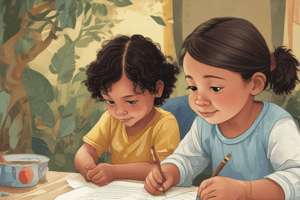Podcast
Questions and Answers
What is the primary purpose of observation in education?
What is the primary purpose of observation in education?
- To observe teachers' performance
- To measure children's growth and development (correct)
- To create a curriculum
- To discipline children
What is the first stage of the cycle of observation?
What is the first stage of the cycle of observation?
- Respond
- Watch, listen, and take anecdotal notes
- Ask questions to find focus (correct)
- Reflect
What is the purpose of anecdotal notes in the cycle of observation?
What is the purpose of anecdotal notes in the cycle of observation?
- To record observations during the observation stage (correct)
- To record children's grades
- To reflect on children's abilities
- To plan activities
What happens during the reflect stage of the cycle of observation?
What happens during the reflect stage of the cycle of observation?
What is the final stage of the cycle of observation?
What is the final stage of the cycle of observation?
How can teachers use the cycle of observation?
How can teachers use the cycle of observation?
What is the purpose of the cycle of observation in education?
What is the purpose of the cycle of observation in education?
What happens during the watch, listen, and take anecdotal notes stage of the cycle of observation?
What happens during the watch, listen, and take anecdotal notes stage of the cycle of observation?
Why is documentation an important part of the observation process?
Why is documentation an important part of the observation process?
Flashcards are hidden until you start studying
Study Notes
Observation in Education
- Observation is a valuable tool for tracking children's progress and measuring their growth and development.
- Observation should always be documented, such as through anecdotal notes.
The Cycle of Observation
- The cycle of observation consists of four stages: ask questions to find focus, watch, listen, and take anecdotal notes, reflect, and respond.
- The first stage, ask questions to find focus, involves drafting questions about children's knowledge, skills, and abilities related to standards, goals, or curriculum objectives.
- The second stage, watch, listen, and take anecdotal notes, involves observing children to find out their needs, interests, and abilities.
- Anecdotal notes are used to record observations during this stage.
- The third stage, reflect, involves using anecdotal notes to reflect on how to support children in moving to the next level.
- The final stage, respond, involves planning activities and strategies to help children achieve their goals.
Applying the Cycle of Observation
- Teachers can use the cycle of observation to assess and plan accordingly, collecting child data to inform their lessons.
- For example, a teacher might ask if a child can write a specific letter, observe the child to find out, and then plan activities to help them learn if they are unable to do so.
- The cycle of observation helps teachers to scaffold children's learning, providing support and guidance to reach their next steps in development and learning.
Observation in Education
- Observation is a valuable tool for tracking children's progress and measuring their growth and development.
- Documenting observations is crucial, and anecdotal notes are a recommended method.
The Cycle of Observation
- The cycle consists of four stages: ask questions to find focus, watch, listen, and take anecdotal notes, reflect, and respond.
- The first stage involves drafting questions related to children's knowledge, skills, and abilities tied to standards, goals, or curriculum objectives.
- The second stage involves observing children to identify their needs, interests, and abilities, with anecdotal notes used to record observations.
- The third stage involves reflecting on anecdotal notes to determine how to support children in moving to the next level.
- The final stage involves planning activities and strategies to help children achieve their goals.
Applying the Cycle of Observation
- Teachers can use the cycle to assess and plan, collecting child data to inform their lessons.
- The cycle helps teachers to identify areas where children may need support, and plan targeted activities to address these needs.
- By using the cycle, teachers can scaffold children's learning, providing support and guidance to reach their next steps in development and learning.
Studying That Suits You
Use AI to generate personalized quizzes and flashcards to suit your learning preferences.




